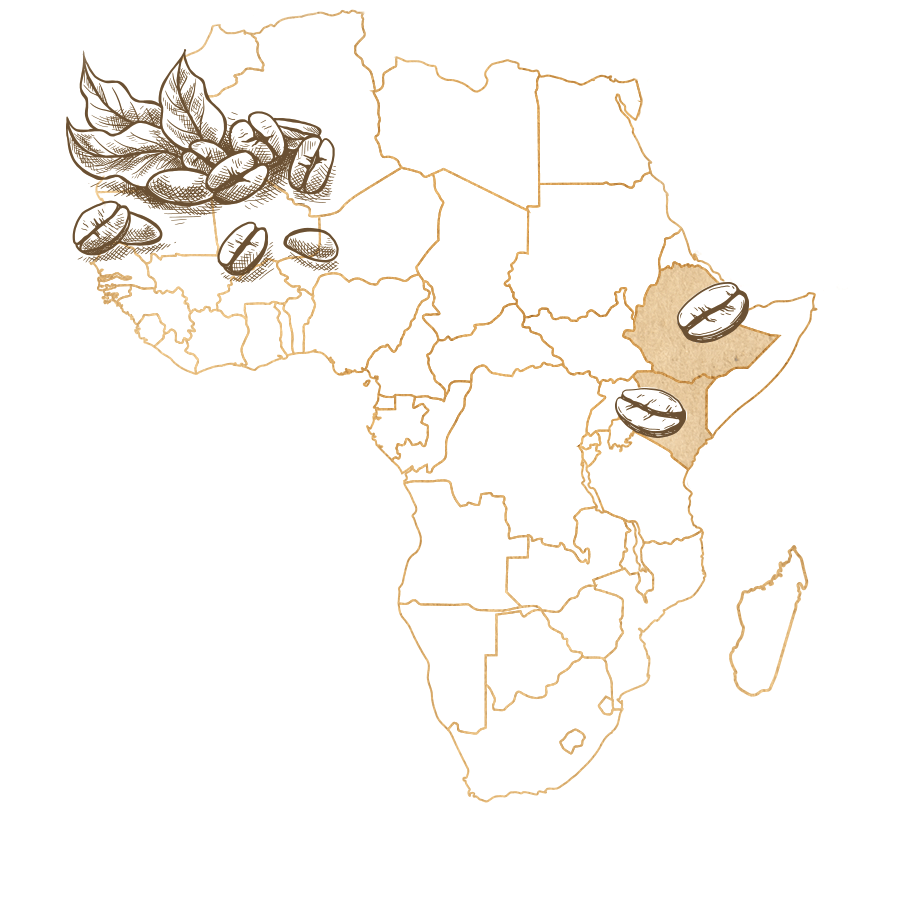COFFEE FARMING IN
THE CRADLE OF COFFEE
Kenyan and Ethiopian coffees are renowned for their specialty grade, yet many of East Africa’s 5 million smallholder coffee farmers face enormous difficulties – running out of money and food between harvests.
Several hurdles to higher earnings exist here. Farms are generally small, averaging less than half a hectare of coffee trees – one-tenth the size of Brazilian or Colombian farms. Yields also tend to be low with smallholders harvesting 50 percent less coffee per hectare than their counterparts in Latin America.
Climate change is also threatening farmers’ productivity and livelihoods.


HAND IN HAND WITH TECHNOSERVE
Since 2013, Nespresso has been working hand in hand with TechnoServe in East Africa, implementing the AAA Sustainable Quality™ Program. It is working to increase the volume of high quality coffee produced in a sustainable way as well as empowering women throughout the supply chain.
“THERE IS A FORCE OUT THERE THAT I BELIEVE WILL MAINTAIN, AND EVEN INCREASE, PROGRESS AGAINST POVERTY: BUSINESS.”
WILLIAM WARSHAUER, CEO, TECHNOSERVE
FARMS: BOOSTING PRODUCTIVITY
The three central pillars of the AAA Program are productivity, quality and sustainability. While all are important and interconnected, the central focus on East African farms is to improve productivity. Key practices such as pruning and plant rejuvenation can help do this yet only a quarter of farms are applying them. Through demonstration plots we practically showcase the benefits these practices deliver, and this is integral to the AAA training given to farmers in East Africa.
The evidence suggests it’s working, with increasing numbers of farmers now applying these techniques. And of course, better yields translate into higher revenue for farmers which also benefits the wider community.


WET MILLS: IMPROVING SOCIAL AND ENVIRONMENTAL COMPLIANCE
The potential to produce high-grade coffee depends not just on producers applying good harvesting practices but also on good post-harvest practices being applied in wet mills. Coffee supply chains in Ethiopia and Kenya are typically structured around these wet mills, which aggregate and process coffee, allowing for greater efficiency and quality control.
However, many use outdated processing technologies, overuse water and treat waste water discharge inappropriately. Through the AAA Program, we help establish new techniques and technologies. Wet mill staff and managers are empowered through training on key practices from AAA Mills Advisors – helping to ensure that cooperatives are both good workplaces and stewards of the communities natural resources.

THE AAA PROGRAM IS IGNITING NEW PARTNERSHIPS
For change to be sustainable, it has to economically benefit all parties. The AAA Program is bringing that vision to life in East Africa, as parties along the coffee value chain experience benefits that will continue long after the program is completed.
The AAA Program is also helping to ignite new, game-changing partnerships. In a landmark USD 6 million collaboration with the World Bank’s IFC (International Finance Corporation), Nespresso is working on a project to support coffee farmers combat the effects of climate change through agroforestry. This investment is made through the Nespresso Sustainability Innovation Fund and includes a USD 3 million grant from the Bank’s BioCarbon Fund Initiative for Sustainable Forest Landscapes - its first ever private sector collaboration to finance an environmental initiative by a business.
“WE ESTIMATED THAT THE AAA PROGRAM HAS HELPED TO GENERATE MORE THAN USD 1 MILLION OF ADDITIONAL INCOME AND WAGES ACROSS ETHIOPIA AND KENYA.”
PAUL STEWART, GLOBAL COFFEE DIRECTOR, TECHNOSERVE
Reach
Farms / wet mills
>66,000 AAA farms
•
264 wet mills supported
Means
Farms / wet mills
182 agronomists
•
Assessment tools
for agronomists
and verifiers
•
The AAA shared
commitment defining
roles and responsibilities
with our suppliers for
the deployment of
the AAA Program
Outcome
Farms
Adoption of new / improved
practices for better
productivity – from
0% to 40-50%
Wet mills – economic impact
Adoption of new / improved
practices resulting in
higher share of high-quality
coffee in Ethiopia – from
29% to 90%
•
Adoption of new / improved
practices resulting in
higher share of high-quality
coffee in Kenya – from
44% to 65%

